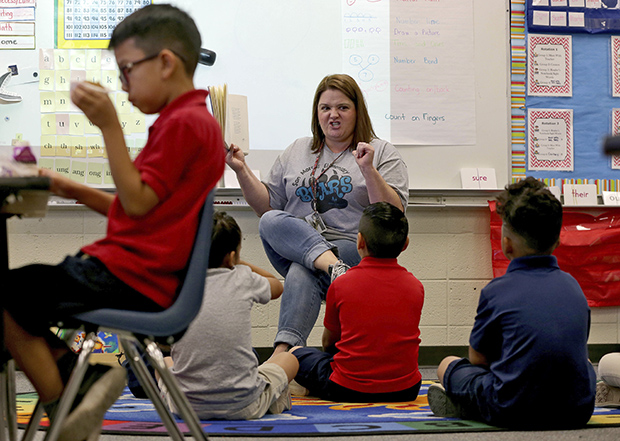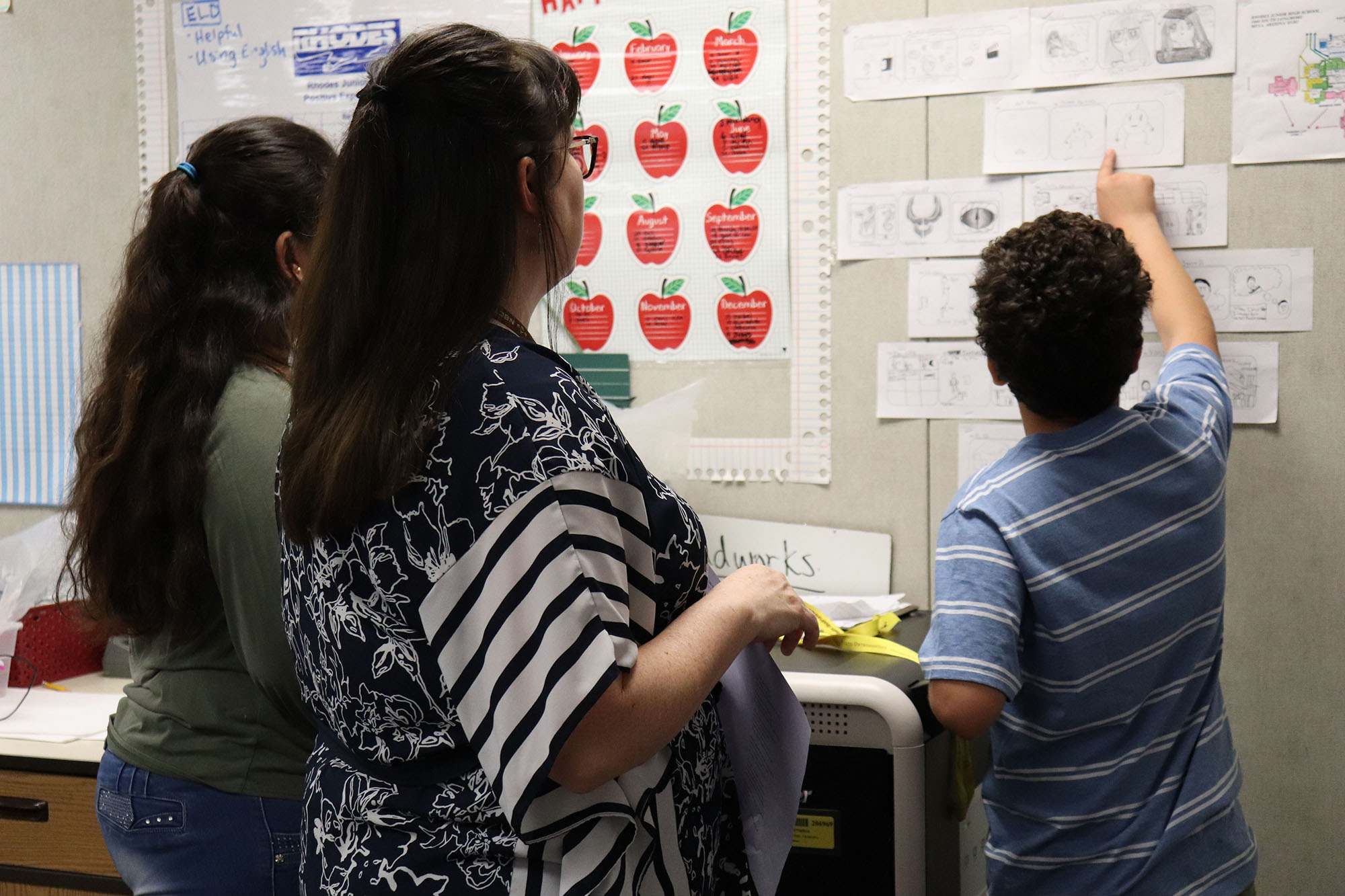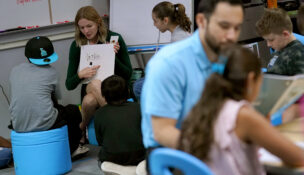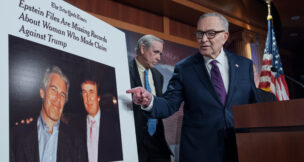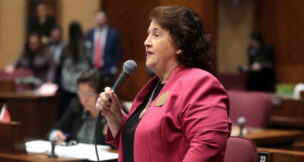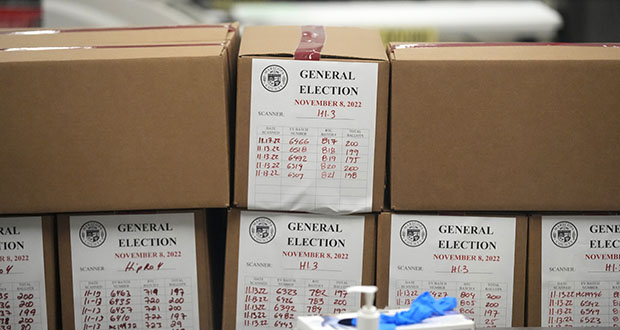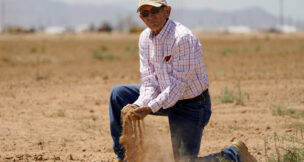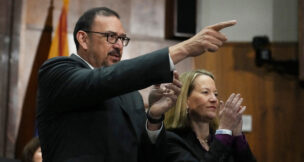Failure to extend Prop. 123 linked to GOP school choice push
Kiera Riley Arizona Capitol Times//July 18, 2025//
Failure to extend Prop. 123 linked to GOP school choice push
Kiera Riley Arizona Capitol Times//July 18, 2025//
Key Points:
- Republicans added school choice protection to funding proposal
- Limiting funds only for full-time teachers caused opposition
- Key GOP lawmaker says proposal need to be simplified
Another legislative session wrought no extension or novel proposal to fill the void left by the lapse of Proposition 123, an education funding model drawing dollars from the state land trust fund. It instead brought a new, although familiar, divide.
Lawmakers, stakeholders and the governor still have another opportunity to formulate a new version of Prop. 123 next session, with eyes now on a ballot measure to run in 2026.
But whether interested parties work in tandem with or against each other remains the key question.
Gov. Katie Hobbs, Democrats, education and business and tax groups pushed for a fairly clean extension, with added flexibility to schools, similar to the initial iteration of the measure.
Meanwhile, Republicans sought to direct dollars for full-time teachers and append protections for school choice to any proposal they planned to push through.
Those dueling interests set Prop. 123 back to square one, with stakeholders now huddling in their respective corners to figure out how to start the conversation back up again in 2026.
Rep. Matt Gress, R-Scottsdale, said, “We will regroup with the caucus, and I suspect that we will re-engage with the executive again in the fall and to try this again as early as possible in the next legislative session. I think that’s key. We want everybody to be on board with this package, because you win through addition, not subtraction.”
The measure, as initially passed by voters in 2016, allowed a jump in the distribution rate from the state land trust fund from 2.5% to 6.9% to supplement funds for K-12 education through the 2025 fiscal year.
A new take on Prop. 123 has had a host of false starts. Lawmakers failed to get a proposal over the finish line in 2024 and continued the trend into 2025.
This session, Sen. J.D. Mesnard and Gress took the lead. The two herded an initial proposal through committee, though with the caveat that it was far from the final plan.
But then education groups, including the Arizona Education Association, the Arizona School Administrators Association, Save Our Schools, Democrats and the governor got wind of a desire by the majority to tie in school choice protections to Prop. 123 and mounted quick opposition, which toppled onto existing contentions with limiting pay increases only to full-time teachers.
Tax groups had their concerns, too.
Kevin McCarthy, with the Arizona Tax Research Association, warned against creating another fiscal cliff, veering off from the state’s per-pupil funding structure and earmarking the dollars for teacher pay.
He noted granting the money per-teacher could result in disparate distribution to schools.
“We should give money to the districts and charters based on how many students they have, and then let them compete for those students, but by how well they do in the classroom, how well they manage their systems,” McCarthy said. “We shouldn’t be rewarding inefficiency.”
But, before agreeing on Prop. 123, attention then shifted to the budget and the clock slowly ran out on the session, leaving amendment or passage of any proposal less and less likely.
“Optimism was growing that we were going to be able to get something through right up until we ran into the budget buzz saw,” Mesnard said.
In looking to the next session, Mesnard said he believes the Senate has a solid foundation to start. He noted no final language on reworked distribution rates or school choice provisions ever really saw the light of day.
“When all the i’s have been dotted and T’s crossed, when we’ve given folks time to recuperate and then circle back around to see where sentiment has settled, once we get to that point where we can then share language, I think people may be a little bit surprised given whatever version they had in your mind, which largely has been speculation right to this point,” Mesnard said.
He continued, “I’m looking forward to that day. I wish it had come this session. It didn’t. So I’m hoping very early into the next (session).”
Gress said for the next session, he hopes to see the prospective proposal simplified.
“If you make a ballot measure too complicated, you also complicate the chances of it passing at the ballot,” Gress said. “It needs to be straightforward.”
Gress said he saw complications in both the teacher’s union, Democrats, and the governor’s push to include all school staff in the school choice push.
“If you load up too many provisions in this bill, I think it again complicates passage. It has to be simple, streamlined, focused and clear so that Arizona voters, when they’re going through the land trust proposal, can feel good about their vote,” Gress said.
But that does not necessarily mean jettisoning school choice provisions altogether.
“I do think that both sides need to recalibrate their approach going into next year so that we can certainly ensure that teachers get a pay raise that they desperately need to stabilize that profession, but to also ensure that all school choice options are protected. I think that there is a balance that can be had,” Gress said. “But again, when you create a Christmas tree of a bill, I think things can go south very quickly.”
As for Democrats, education groups and the governor, the hope is for a bipartisan bill free of any school choice provisions.
Rep. Nancy Gutierrez, D-Tucson, said a clean renewal of the funds to allow flexible funding to schools would benefit more than a sequestration to teacher salaries, noting varying needs across districts.
She also stressed the need to iron something out, though, and hopes for Democrat involvement in the next session.
“It’s hundreds of millions, millions of dollars that we’re literally just throwing away instead of figuring out a bipartisan solution to make it work, that bipartisan solution, in no way, shape or form is going to be including vouchers, but I’m confident that we can come up with something, and I think it would be irresponsible for (Republicans) not to include us,” Gutierrez said.
Hobbs echoed the same.
“It was unfortunate that we saw some folks try to put forward a very partisan renewal plan, and I think that failed even in the chambers that have Republican majorities,” the governor said. “I think that indicates there’s appetite to work together for a bipartisan solution, and we’ll be looking at our options and working on that over the summer.”
Arizona Education Association President Marisol Garcia stressed the need to bring educators themselves to the table.
“It’s all about context. And I think that’s the one thing that professional educators can give you is the context,” Garcia said. “And so when we’re not part of those conversations with legislators, you miss the mark.”

